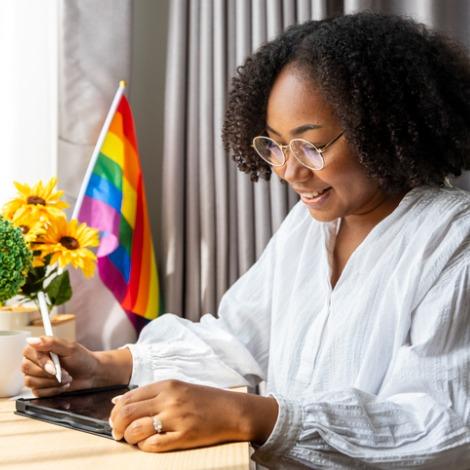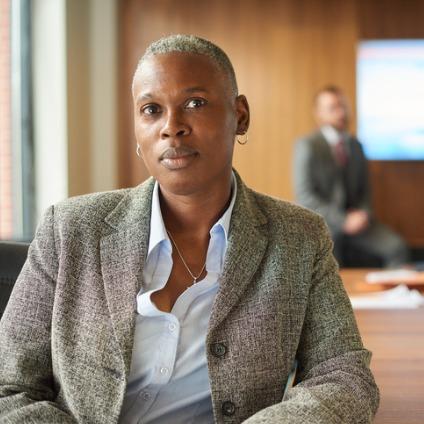In a world that many in the LGBTQ+ community feels is regressing in terms of acceptance and, in some cases, even tolerance, being an ally to the LGBTQ+ community at work is increasingly important.
Over the last few years, reported hate crimes against LGBTQ+ people have been increasing at an alarming rate. And the 2018 Government Equality Office National LGBT Survey showed that 40% of the community had experienced a negative incident simply because they were part of the LGBTQ+ community.
What does it mean to be an ally?
From an inclusion and belonging perspective, I believe an ally is someone who supports, advocates for, and stands in solidarity with, those who belong to marginalised and/or under-represented communities. It involves actively educating yourself, challenging biases in yourself and others, and taking action to create a more inclusive and accepting workplace.
I believe that there are different stages of allyship that people choose consciously or unconsciously, all of which are positive.
Where to start
Educate yourself
A crucial step in becoming an ally is to educate yourself about the LGBTQ+ community. I think this applies to those within the community as well as those who don’t identify as belonging to it. I have certainly learnt so much more about different identities since becoming the inclusion and belonging lead, and I hope it continues.
No one expects everyone to know it all, and much of it is still evolving, but I think that being open to learning is important. Take the time to learn about different sexual orientations, gender identities, and the unique challenges faced by LGBTQ+ individuals. You can read books or blogs, watch documentaries, access online resources that provide accurate information and personal stories, or engage with any Pride activities taking place in your own organisation – not just in June.
By understanding the terminology and experiences of the community, you can engage in informed conversations and help dispel misconceptions. As part of LGBT History Month 2023, we compiled a glossary of LGBTQ+ terms to help get you started. You can refer to this glossary as much as you like and share it with your colleagues.
Listen to those around you
Listen to the experiences, stories, and perspectives of LGBTQ+ individuals that are in your life – whether that’s at work or in your personal life. If your immediate circle of contacts doesn’t present you with these opportunities, then actively seek them out to hear their voices.
By listening and showing understanding, without judgement or interruption, and being open to learning from their lived experiences, you can gain insight into the challenges faced by the community and identify ways to provide support in the future.
At Reed, we have LGBTQ+ ambassadors who are always open to a conversation to help educate others, which you could easily implement or advocate for in your own company.
Challenge your biases
We all have biases – it’s a natural part of human psychology – but it’s essential to recognise and challenge them in order to be an effective ally. Reflect on your own beliefs and attitudes towards sexual orientation and/or gender identity and be honest with yourself about any prejudices or stereotypes you may hold and actively correct yourself to overcome them.
One way to understand your biases is by undertaking any internal training on unconscious bias or inclusion and belonging that your company offers, as part of your regular learning and development.
Use inclusive language
Language is really important as it can have a powerful impact on those around you, whether they are part of the community or not. Take time to learn the terminology that’s respectful to the diversity within the LGBTQ+ community, which you can do using the aforementioned LGBTQ+ glossary.
As part of the community myself, I will forgive those who make genuine mistakes. Personally, I put more emphasis on the intent behind what’s being said and the way it is being said. However, I know a lot of people can worry about offending others. Here are some tips:
Try not to make assumptions about someone's sexual orientation or gender identity based on appearance or stereotypes – wait for them to share with you.
If you’re unsure of someone’s gender identity, use gender-neutral pronouns such as ‘they/them’ – and offer your own pronouns to invite them to respond with theirs.
Respect individuals' chosen names and pronouns if they share them with you.
If you make a mistake, there is no need to be defensive. Simply own up, apologise, and move on, with the intention to do better in the future.
Becoming an ‘active ally’
Support those who you know to identify as LGBTQ+
Work can – and should – be a safe place for those in the LGBTQ+ community. Supporting those who you know to be within the community can be crucial, especially during challenging times. Be there to offer a listening ear, emotional support, and a safe space to share experiences. Respect confidentiality and be mindful of the sensitivity of their stories.
Additionally, be aware of the specific challenges faced by LGBTQ+ individuals, such as higher rates of homelessness, ostracism from family and friends, and mental health issues. Educate yourself on available resources and organisations that provide support and share them when needed.
Call out discrimination
As an ally, it is important to actively challenge discrimination and prejudice when you encounter it. Speak up against homophobic, biphobic, acephobic and transphobic comments or jokes. Even if they come across as ‘banter’, it can be extremely harmful as an LGBTQ+ person to hear these things go unchallenged, or to always have to do the challenging. Be prepared to engage in respectfully challenging those that you feel are being discriminatory and make them aware of the potential effect of their actions.
Support LGBTQ+ events and charities
There are a plethora of events and charities you can support including Pride Month in June and LGBT History Month in February. There are a wide range of local, national and international charities you can support.
At Reed, we make it easier for our co-members to give to charity through our partnership with Charities Trust, allowing each person to give to charity directly from their gross pay every month. This could be something to consider for your business if it hasn’t already been implemented.
Conclusion
In the spirit of Pride Month, let us recognise the immense importance of being an ally to the LGBTQ+ community. As allies for any under-represented group, we have the power to drive change, advocate for equality, and foster inclusive spaces where everyone feels valued and respected.
Just by taking the time to read this article, you are on your allyship journey. By calling out discrimination, challenging stereotypes, providing emotional support, and promoting visibility, you can contribute to a more equitable society. Let us make our workplaces somewhere LGBTQ+ people not only feel they belong but somewhere they can thrive.
Contact a Reed recruitment specialist today to find your next role or a talented professional.




